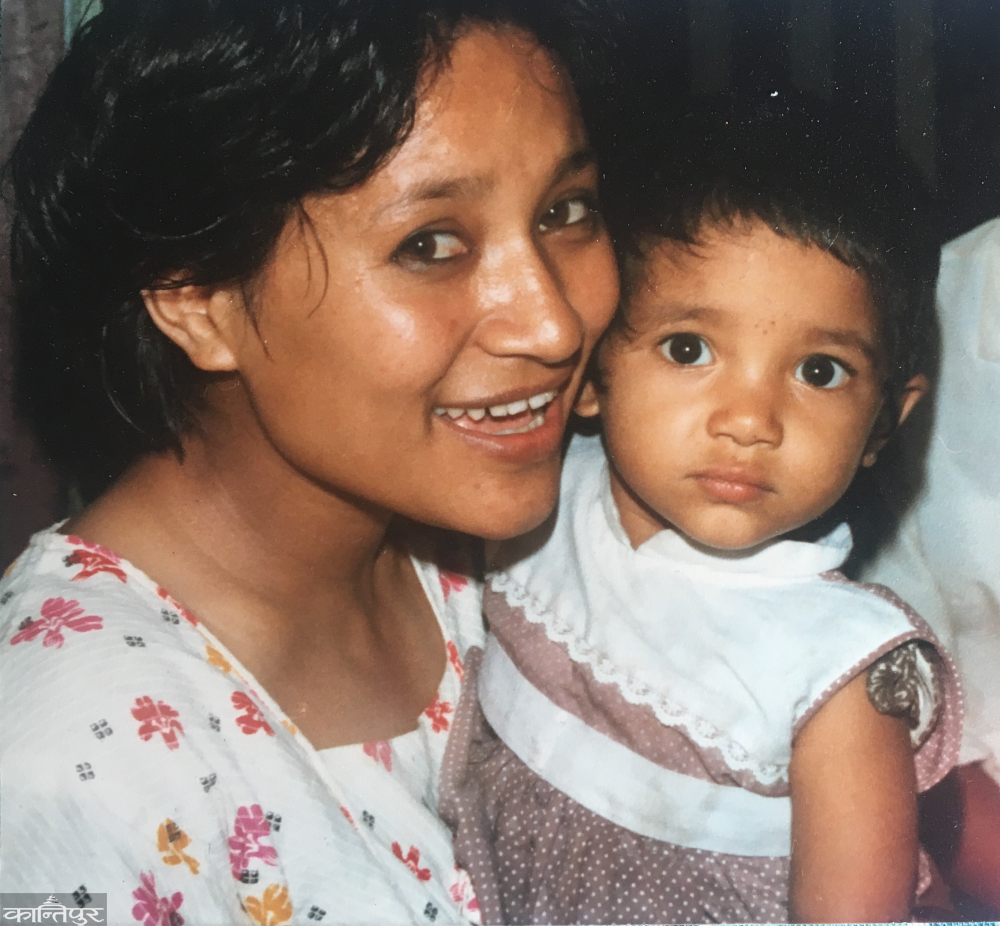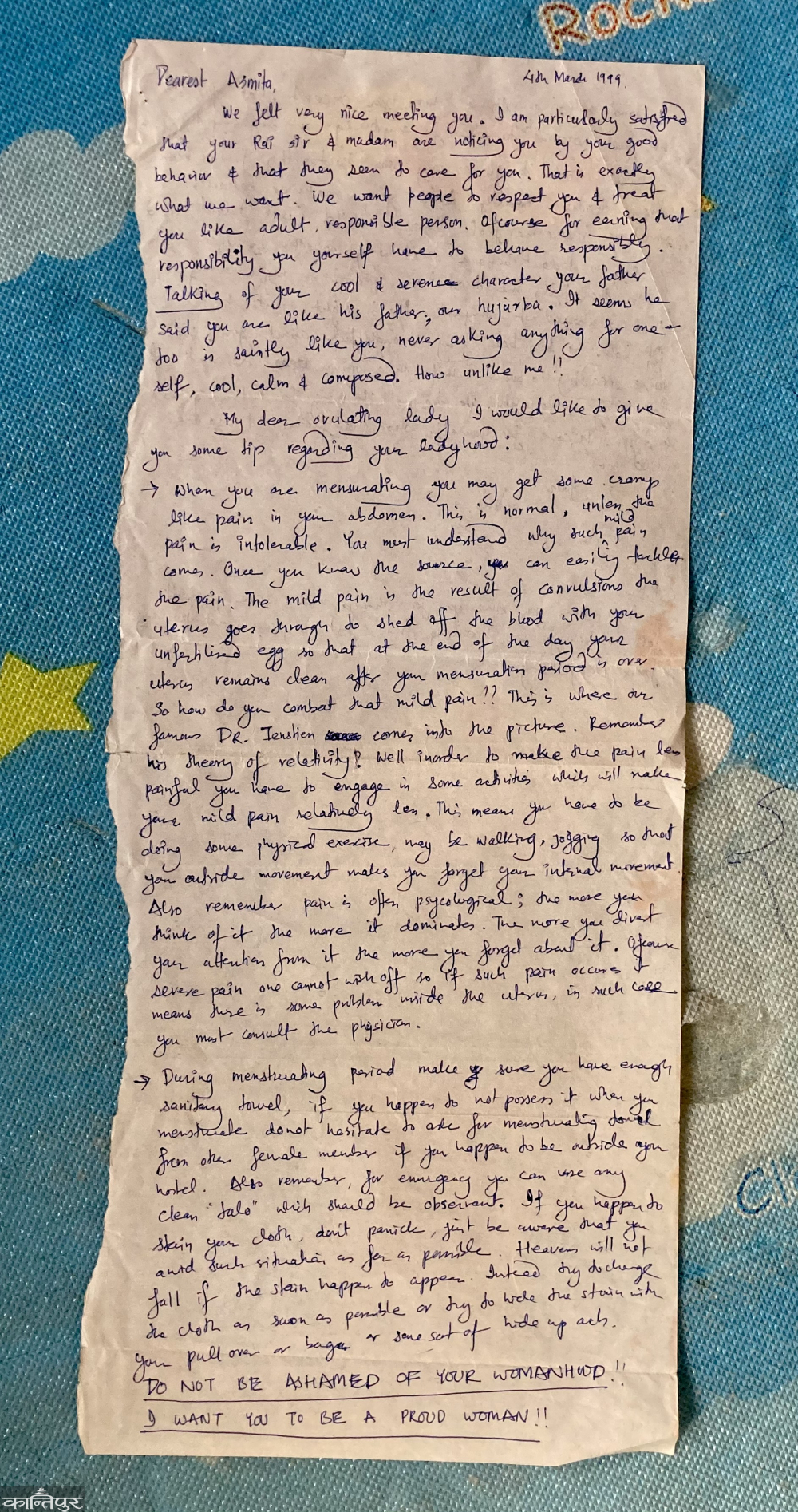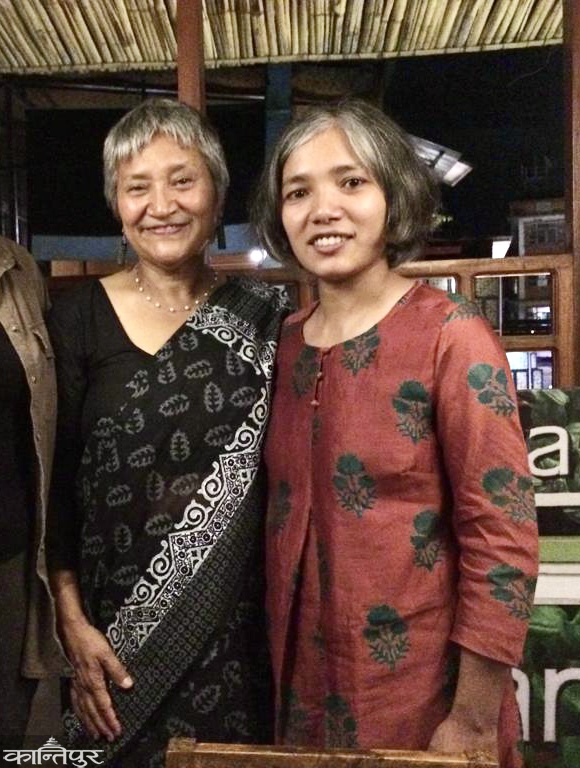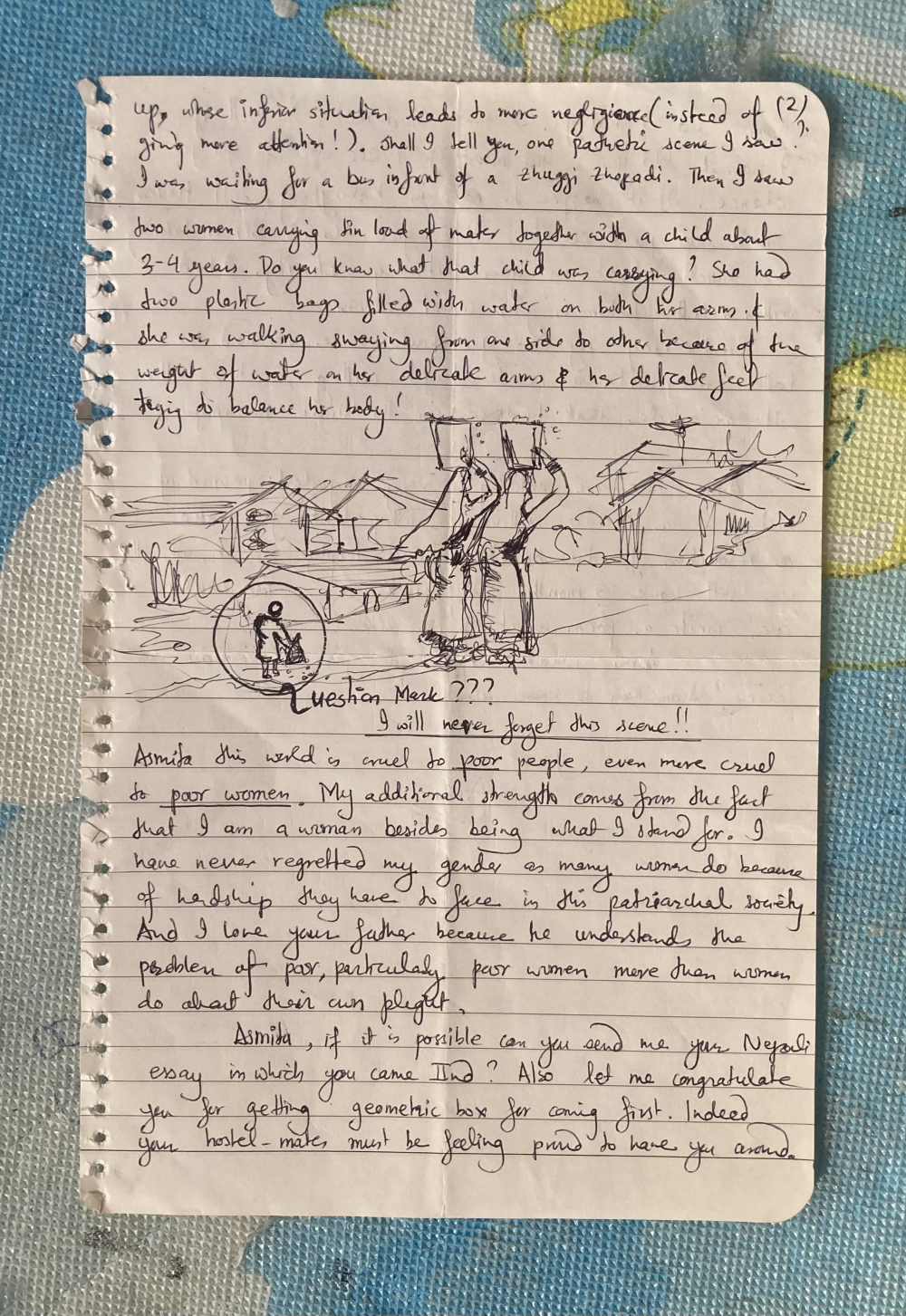A mother who teaches life through letters
We use Google Cloud Translation Services. Google requires we provide the following disclaimer relating to use of this service:
This service may contain translations powered by Google. Google disclaims all warranties related to the translations, expressed or implied, including any warranties of accuracy, reliability, and any implied warranties of merchantability, fitness for a particular purpose, and noninfringement.


There was something even in lonely, lonely days, which did not let Manushi down. On those colorless days, his memory was hanging on the pillar, mother Hisila Yami (65). Manushi lived an underground life as a child.


Jail, bardiwala-police, spice processions, agitations and loud slogans- these were Manushi's childhood pictures, which are deeply etched in her brain-treasury. Manushi is a witness to the ups and downs of father Baburam Bhattarai and mother Hisila, who were involved in the revolution to 'change the world'. His romantic dreams, some sorrows and revolutionary nights. Hisila, Baburam and Manushi are eyewitnesses of history-change.
Baburam-Hisila's 'Kranti-Sapana', daughter Manushi's childhood was spent alone, without physical support from her parents. Manushi had - some vague memories, letters from parents sent from time to time full of love and advice. Those letters were the school that taught me life, the basic pillars. Those letters guided me,” says Manushi. How versatile was life then? Manushi questions herself every now and then. She answers to herself - she learned a lot in life by experiencing things in a different way than other children. When turning the pages of her childhood-diary, Manushi gets stuck at a point, where there were the thick walls of the prison with 'Prohibition' written on them .
Manushi remembers vaguely, she was sick with fever for 4 years. In the protest of 046, the police came to the house, to take Hisila. Holding someone's hand, she reached the jail to meet her mother. After requesting the jailer, Hisila gave Manushi a prison tour. Prisons have certain natural smells - fear, innocence and despair. Perhaps a person feels very innocent in prison. 'My mother knitted a sweater, maybe that was the first and last sweater she knitted, she gave it to me,' Manushi remembers - Hisila. Whose life path is a story of struggle, fatigue and sleepless nights. Dharmaratna reached Lhasa in his youth. It was such a time, young men from Kathmandu (originally Newars) who were traveling from Nepal to Lhasa for business used to fall in love and settle down there. Some young Tibetans used to bring their wives to Kathmandu. Unsuccessful young men used to leave their love or married girls in Tibet and return to Kathmandu. Dharmaratna Yami, who returned to Kathmandu from Tibet, has a short poem - 'Sandeya Lisah'. It has been translated into Nepali by the poet Durgalal Shrestha under the title 'Lhasa Bolchhe'. Hisila is the heroine of 'Sandeya Lisah' written by Dharmaratna when he was jailed in the democratic movement before 2007.
In Newari, 'hisi' means - hissi pareki. Hisila is not only a Nepali-language word, it is also in vogue in Lhasa. The book says – In Lhasa, Dharmaratna fell in love with a girl named Hisila. He wanted to return to Kathmandu with hisila. However, Hisila was not interested in going to a foreign country.

There is a paragraph about Hisila in the book:
Yami looked at her and Muhar looked at her, she answered without speaking
she smiled and smiled
Hisila opened the shop as usual
Hisila tei why Yami hid and was shy In the book
, Dharmaratna has also written the story of Lhasa and Srangchangampo 1400 years ago.
After returning to Nepal, Dharmaratna named his youngest daughter Hisila. After dropping his father's surname 'Tuladhar', Dharmaratna wrote 'Yami' after his name, which means - Kathmandu resident. He also became a minister in the government led by Dharmaratna Matrikaprasad Koirala (2008). Mahapandit Rahul Sankrityayan has written a lot in his travel literature, on Dharmaratna Yami. Dharmaratna's house was in Bhurungkhel, bought by Shri 5 Tribhuvan.
Hisila returned home after spending her youth for 'Janyuddha'. Her book 'Hisila: From Revolutionary to First Lady' tells the story from the background of the 'People's War' to the peace process. The book describes the war directly through the eyes of Hisila. The storybook tells about the ups and downs, feelings, sorrows and joys of his life. Manushi (2042), the younger daughter of Hisila, was born in Bhurungkhel in the dera of her mother's house. The semi-subterranean father Baburam was involved in full-time politics, rarely coming home. Hisila Pulchok, an architect, used to teach at the campus and was the president of Anem Sangh. Hisila used to take Manushi regularly - to masala processions and other political events.
Hisila built a house in Koteshwar from her earnings alone. Got a scholarship to study in UK. But who will take care of the daughter when she goes to Britain? Hisila was in trouble. According to the provisions, male students can go with their families, female students will not be allowed to take their families. "I will take my daughter too," he argued at the embassy. When Manushi was 7, Hisila took her to Britain.
After reaching Britain, Hisila fell victim to depression. She was overwhelmed by the stress of studies, thesis and children. Hisila was studying Masters in Architecture – Housing. According to the rules, Manushi is not legally allowed to stay in hostels. Housing was the first problem of Hisila. Hisila kept Manushi hidden - illegally. "You used to say just sit down without making a fuss. My mother also sent me to London for a few months, with an Iranian family.' Thus Manushi reached London from Newcastle, UK. While in the UK, Hisila used to take Manushi to the library and swimming. Baburam Bhattarai used to send letters addressed to Manushi. As it was written - 'Today Parijat passed away' or 'Today Madan Bhandari passed away'. Manushi thought – Madan Bhandari drowned without swimming in the river. So she wrote a reply to her father Baburam - you must also learn swimming.
Manushi remembers an evening three decades ago when her parents went underground. Recently returned to Nepal from UK - Hisila and Manushi, in 051. One evening, Baburam Bhattarai said to Hisila, "Now we have to go underground." On February 1, 2005, the Maoist party started a "people's war" with the aim of "ending the monarchy and establishing a people's republic." Baburam and Hisila went underground. Manushi's days after that were completely different from what he had lived before. Manushi Yami Bhattarai is created by combining some curved lines and some simple lines.
Manushi lived in Koteshwar, first with her uncle-aunt, later with her grandmother. She used to study at Holyland School in Baneshwar. The CID used to monitor him before the home-school gate. One evening underground Prachanda came to meet Manushi in Koteshwar. Said - Your mother has sent a letter and handkerchief. It was written in the letter - 'You can no longer be called Manushi. You have to choose another name. Manushi chose a new name – Asmita. Thus, at the age of 10, she was given a new name – Asmita Singh. Her name in government documents is Asmita Singh (Manushi Yami Bhattarai). And then he started receiving letters in the name of 'Asmita'.
'I did not grow up with my parents. "I don't miss my parents," says Manushi, "I spent most of my life with other family members." Manushi used to get letters from Hisila every now and then. Where am I? What am I doing?' was not written. It was only written - read, take care of yourself. In the eyes of others, it was not the 'normal life' of Manushi, but Balakha was for Manushi - ordinary life and ordinary daily life. He did not care about the CID or the police. Child mind was playful, sharp. Where did you understand - conspiracy, politics and tanawana?
After that, Manushi survived some setbacks, some days of joy - went underground, reached India. She started studying 6th grade in a school in Nainital, lived in hostel in 055. Parents had no permanent address. Once Manushi's school's parent's day date was moved. However, his parents were not informed about the date change. They did not come to the parents' day, who had come to school some day before, Manushi was disappointed that day. After Parents' Day, school was out for a long time, friends went home. Manushi was the only student in that entire school, the principal kept her with her. Manushi was drinking coffee in the middle of the
interview. But his memories kept coming back - a picture of a lonely man walking alone on the school grounds in the cold months of frost or rain. A picture of a girl with a withered face being led to a hostel. That pale, pale face she remembers now, it was hers. At that time I was crying alone. I was an introvert, I couldn't tell others about myself and my parents", says Manushi.
After studying in Nainital for two years, he was sent to Pedung, West Bengal, to study. At that time, for Manushi, "Mother means letter, letter means mother". He was given a location, his mother's address. Manushi also used to send letters to that 'secret address'. Hisila used to teach Manushi about life in letters. She used to write - there is a lot of sadness in life, you have to experience it too. She would gradually make Manushi 'psychologically ready to understand suffering'. As she once wrote in a letter – Your father may be killed. In the second letter she wrote again – I can be killed too, but you must lead yourself on the right path. In the third letter, she wrote - you are also in danger, something may happen, take care. What would be Manushi's state of mind after receiving such a letter?
'That generation was fearless, as if they were old before their age. I was an introvert. I read Marx, Lenin, Parijat in school. Even though it was written in the letter itself, it seemed that this was happening in the movement. That's why I didn't experience fear,' says Manushi.
The Nepali translation of a letter sent by Hisila to Manushi (written in English) about Rajashwala is as follows:
Dear Asmita,
...your father said about your calm nature - you are like his father, your grandfather . It seems that he is also of sadhu character like you, he should not ask for anything for himself, he is calm and stable . Just the opposite of me!
My dear growing daughter, I want to enlighten you about your teenage years. When you're bleeding, you may have cramping pain in your stomach . This is normal, until the pain becomes unbearable . You must understand why there is such excruciating pain. Once you know its cause, you can deal with the pain easily . When your uterus contracts and bleeds out with the unfertilized egg, your uterus will remain clean after your period. How to deal with mild pain? Remember the famous Einstein's 'Theory of Relativity' at this time. To reduce the pain you should engage in some activity, which will reduce your pain a little . This means that you do light physical work (maybe walking outside) so that the outer movement can forget your inner movement. And also remember that pain is psychological - the more you think about it, the more it gets. The more you separate your attention from it, the more you forget it . Of course, too much unbearable pain is not going to go away, so having such excruciating pain means that there is a problem inside the uterus, in which case it is necessary to consult a doctor .

Never be ashamed of your femininity!
I want to see you become a woman you can be proud of!!
There is another letter from Hisila to her daughter, where it is written - women's sorrow and pain. The letter is like this:
I will tell you about a touching scene I saw today! I was waiting for the bus in front of Thuggi Thopadi . At the same time, I saw two women carrying tin pots full of water on their heads, along with a 3-4 year old child. Know what she was carrying? Plastic bags filled with water were hanging on both his arms. Due to the weight of the water, his walk was automatically tilting from left to right. Kamala was trying to balance her body with her arms and legs. I will never forget this scene. This world is unkind to poor people, even more unkind to poor women. The extra energy from within me comes from what I fight for as well as the fact that I am a woman . I have never regretted my gender, which many women do because of the hardships they face in this patriarchal society . And, I love your father because he understands the suffering of the poor, especially those poor women, who face their own pain regardless of others.
After graduating from Delhi University, Manushi emerged into politics in 2065 from the Swaviyu elections. She wrote the name of the first student to win the secretary position in Kirtipur Central Campus with many votes. She completed her Masters in Political Science from Central Campus and later did MPhil in Political Science from JNU. Young leader Manushi has now become a mother herself. "Being a mother is as special as sitting in sadhana," says Manushi, "A mother has the biggest responsibility in the world." Physically, mentally, socially, the responsibility she carries out towards her children is special. But, in a country like Nepal, mothers are considered second class.'
Hisila always left Manushi free. She never said 'do this', 'you should be like this'. Even if Manushi was in pain, Hisila would say - 'You have to suffer, experience it, you have to go through this process. Because there is so much suffering in the world.' Manushi thinks, she said that after seeing her mother's suffering and remembering her struggle. Manushi sometimes snorts remembering her childhood. "There was always a physical distance between mother and father, but childhood passed happily," is Manushi's experience.
Hisila's mother passed away while studying at Kanya Mandir in Kathmandu. His elder sister Timila was studying engineering at IIT College, Kanpur. Hisila also went to Kanpur, passed matric. She then passed her graduation from School of Planning and Architecture, Delhi in 1982. There he met Baburam Bhattarai. M. in 1995 from Newcastle University UK. Arc reading is over. According to Manushi, 'Hisila was always aware of women's issues'. Inspired by the name of her beloved magazine 'Manushi', she named her daughter. Hisila tells Manushi, ``Money should be spent very sparingly.'' Perhaps her mother's habit has changed - Manushi used to go to school by walking instead of on the school bus thinking that she should save money.
In the year 2077, social networks and newspapers wrote about the leader Hisila, who has been a minister several times - 'Asia's corrupt woman', 'South Asia's most corrupt woman leader'. In response to that accusation, Hisila said - if corruption is proven, I will go to jail. Manushi feels that her mother became a victim then. She says, ``Those who could not attack Baburam attacked women. That the accusation had to be confirmed, that there had to be immense wealth. In life, there are shortages, but this should be heard.' And, to his surprise, his mother easily digested such a big accusation. Manushi says, 'hearing such accusations makes you angry, sad and angry.'

Manushi respects her mother more than her father in politics. "You are very talented, my mother. He sings, dances and paints. My mother has made the most difficult decision during the civil war - leaving the child, leaving the house. It was easy for Ba to go underground, but not for Ma,' says Manushi. 'Manushi has a habit that Hisila doesn't like - she thinks after she speaks, she doesn't think before she speaks. A suggestion to the mother of daughter Manushi - think before you speak. He loves his mother's 'innocence' very much. Manushi thinks that her mother is innocent like a little nanny. Hisila-Manushi is a member of the Secretariat of the Congress Organizing Committee of the Nepal Samajwadi Party. Hisila now lives in Gorkha, has added a room to the house. Manushi thinks that her mother's life and politics are a school of experience, struggle and learning.



 ३०.१२°C काठमाडौं
३०.१२°C काठमाडौं

















